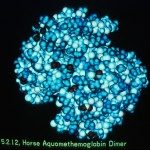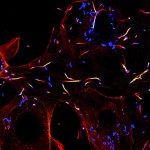Lien vers Pubmed [PMID] – 23293080
Blood 2013 Feb;121(9):1563-73
Receptors for the Fc portion of IgG (FcγRs) are mandatory for the induction of various IgG-dependent models of autoimmunity, inflammation, anaphylaxis, and cancer immunotherapy. A few FcγRs have the ability to bind monomeric IgG: high-affinity mouse mFcγRI, mFcγRIV, and human hFcγRI. All others bind IgG only when aggregated in complexes or bound to cells or surfaces: low-affinity mouse mFcγRIIB and mFcγRIII and human hFcγRIIA/B/C and hFcγRIIIA/B. Although it has been proposed that high-affinity FcγRs are occupied by circulating IgG, multiple roles for mFcγRI and mFcγRIV have been reported in vivo. However, the potential roles of hFcγRI that is expressed on monocytes, macrophages, and neutrophils have not been reported. In the present study, we therefore investigated the role of hFcγRI in antibody-mediated models of disease and therapy by generating hFcγRI-transgenic mice deficient for multiple endogenous FcRs. hFcγRI was sufficient to trigger autoimmune arthritis and thrombocytopenia, immune complex-induced airway inflammation, and active and passive systemic anaphylaxis. We found monocyte/macrophages to be responsible for thrombocytopenia, neutrophils to be responsible for systemic anaphylaxis, and both cell types to be responsible for arthritis induction. Finally, hFcγRI was capable of mediating antibody-induced immunotherapy of metastatic melanoma. Our results unravel novel capabilities of human FcγRI that confirm the role of high-affinity IgG receptors in vivo.




